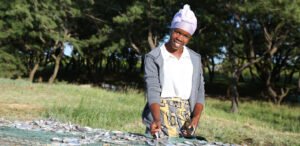By Murimi Gitari, November 7, 2022
The International Centre of Insect Physiology and Ecology (icipe) in Kenya will receive further funding from the Australian Government following a new agreement that was signed on Wednesday this month in Brisbane.
Through the Australian Centre for International Agricultural Research (ACIAR), the Australian government will provide annual core funding contributions of up to A$500,000 to the Insect research centre based in Nairobi, Kenya as part of efforts to explore the role of insects sustainable agrifood systems and biosecurity.
Signed today at the TropAg conference, the agreement builds on a long-running partnership between ACIAR and icipe that has seen insect-for-feed research improve African livelihoods and help sprout a new industry.
ACIAR CEO Professor Andrew Campbell noted that insects show great potential in helping transform global food production, with icipe to play a leading role in unlocking the sector’s potential.
‘Insects will become increasingly vital to how the world sustainably feeds itself,’ Prof Campbell said.
‘ACIAR has been funding icipe on a project-level basis since 2014, and we’ve seen firsthand how insects like the black soldier fly can help farmers turn food waste into high-protein animal feed and fertiliser with minimal impact to the environment.
He also noted that Icipe has established itself as a world leader in insect physiology and ecology research, and that ACIAR were proud to be strengthening their commitment to icipe by providing ongoing support reflective of Australia’s commitment to sustainable development.
The centre becomes the sixth research organisation to receive core funding from ACIAR, joining the likes of the CGIAR, the Pacific Community (SPC); the World Vegetable Center (WorldVeg); the Centre for Agricultural Biosciences International (CABI); and the Asia-Pacific Association of Agricultural Research Institutions (APAARI).
The Australian Government, through ACIAR, provides ongoing funding to international agricultural research for development institutions to support the production and maintenance of global and regional public goods. This type of consistent investment underpins long-term strategic research initiatives while safeguarding organisational capacity and ongoing operations.
The Director-General & CEO of icipe Dr Segenet Kelemu, welcomed the investment from ACIAR and commended the Australian Government for its long-term commitment to enhancing food systems and strengthening ties between Australia and Africa.
‘Icipe operates in partnership with more than 60 universities and 300 partners, with a huge number of initiatives across Africa and around the globe that take a holistic approach to human, animal, plant and environmental health,’ said Dr Kelemu.
‘We’re an organisation that can lead international efforts to embrace and maximise the potential of insect technology. ACIAR has a strong partner in icipe that will positively impact the African continent and beyond.’
ACIAR joins a select list of organisations that provide core funding to icipe, including the Swedish International Development Cooperation Agency; the Swiss Agency for Development and Cooperation; the Federal Democratic Republic of Ethiopia; and the Government of the Republic of Kenya.
‘Significantly, core funds support the exploratory phases of novel research areas, helping to generate the evidence base needed to attract project investments,’ Dr Kelemu added.
‘The funds also serve as a bridge for researchers and projects between funding phases. Indeed, without core funds, it would be difficult for research and development institutions to undertake their main business effectively.’
ACIAR first invested in icipe in 2014 in a co-funding arrangement with Canada’s International Development Research Centre as part of a broader effort to develop and scale-up sustainable, climate-resilient and gender-responsive innovations for smallholder producers.
ACIAR and icipe are currently partnering with AgriFutures Australia in a knowledge-sharing initiative to accelerate insect farming as an emerging industry in Africa and Australia. AgriFutures Australia has identified insect farming in Australia as having high potential to reach a value of A$10 million per annum by 2025.







